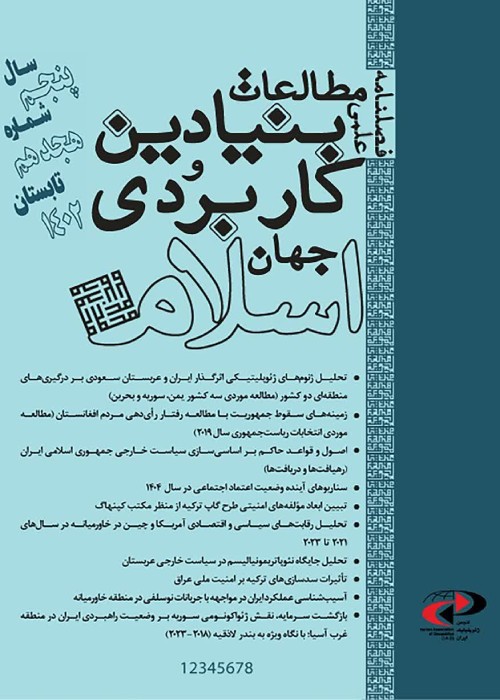Explain how to de-secure Iran-Afghanistan relations from 2000 to 2019
along the years of relationships , these two countries have witnessed various kinds of engagement within political, economic and security areas. Among the most important issues between our two countries are, Hirmand River,the problem of narcotic,Taleban Terrorism and the problem of Afghan refugees as well as economic cooperation. Utilizing the descriptive-analytic method, this article provides true answers to the question of how the relationship between Iran and Afghanistan can be proceed within the De-security framework during 2000 to 2019. In order to test and evaluate the hypothesis of utilizing the theoretical concepts and parameters of securitization -desecuritization within the framework of Copenhagen Security School, endeavors have been taken place to understand better the relationship between two countries within the axis of dsescuritizstion. From this perspective, in answer to the main question, it should be said that with the gradual removal of security issues from the narrow military and political sphere and the transfer of foreign policy from the political-security layers to the economic-trade layers, Iran-Afghanistan relations is at the desired levels of their agents. The country will move towards insecurity. A look at the relations between the Islamic Republic of Iran and Afghanistan shows that these two countries are affected by each other due to their neighborhood. For example, the civil war in Afghanistan led to instability on Iran's borders and the influx of Afghan refugees into Iran. However, there are several factors in the formulation of security policies that have hindered the development of other relations and the emergence of challenges in Iran-Afghanistan relations. From the perspective of the Islamic Republic of Iran, US and NATO military movements in Afghanistan, political-consensus instability, and economic instability resulting from the presence of the Taliban and al-Qaeda in Afghanistan, along with drug trafficking, especially in the post-Taliban period from 2000 to 2019. It has been a collection of sources threatening the national security of the Islamic Republic of Iran. This issue has emerged in the formulation of Iran's political-security relations with Afghanistan. This approach has hindered the development of economic-trade relations as a first step of cooperation and coordination. From this perspective, getting out of the narrow military circle is criticized from the point of view of those who considered security one-dimensional and in military dimensions, and comprehensive security is discussed. For this purpose, the above research seeks to study the theory of the Copenhagen school and explain relations Economic and trade and its impact on foreign policy orientation in order to destabilize relations; To answer the question of how the relations between Iran and Afghanistan during the period 2000 to 2019 are in the process of becoming insecure? Theoretical Framework According to Buzan, security is a sense of security (mental security), protection against danger (objective security) and freedom from doubt (trust in the personal perceptions of others) .The process of securing issues goes through four main stages: first, the security discourse, which refers to the identification and urgency of existential threats against the government; second, the legitimacy and public acceptance; third, emergency security operations to deal with threats; These actions affect the internal and external relations of governments . According to the practical solutions of the Copenhagen School to make many phenomena and threats insecure, an efficient political system is necessary to discuss the process of generating security threats before considering the appearance of the threat. the concept of building security is one of the most important topics in the Copenhagen School. A phenomenon becomes a security phenomenon when the actor secures the phenomenon during the process and his audience accepts it. Belief in "manifestation of threat" and "public acceptance" are the two main pillars of "security logic". History of Iran-Afghanistan relations The Islamic Republic of Iran is neighboring 15 countries, but due to historical and cultural commonalities between Iran and Afghanistan, the relations between the two countries are different. The two countries have a common history, culture, religion and language, and in many other cases there are many commonalities and even a common enemy. The Islamic Republic of Iran has always tried to pursue good neighborliness properly. During the years of holy defense, when Iran was facing many problems, it did not hesitate to cooperate with Afghan refugees, which shows the depth of relations between the two countries. After the victory of Jihad, Iran was aligned with the Mojahedin government and did not leave the Afghan people alone during the Taliban rule. After the fall of the Taliban, he also helped build and institutionalize the government. Iran and Afghanistan, despite having a common political border and common cultural and religious interests, are believed to have the greatest potential for expanding political, security, economic and cultural cooperation. Conclusion The economic diplomacy of the Islamic Republic of Iran in Afghanistan has been a common element of profit and profit and an effective and relatively sustainable lever in managing water disputes, if the two countries can define a package of mutual interests in the form of economic diplomacy, this dependence Bilateral economic, the two sides will share in the fair use of water resources. In these circumstances, when the outcome of the combination of economic diplomacy and the water issue forms a kind of win-win diplomacy and paves the way for a major deal, it is highly likely that the parties can reach a common solution to the management of the existing water dispute.
- حق عضویت دریافتی صرف حمایت از نشریات عضو و نگهداری، تکمیل و توسعه مگیران میشود.
- پرداخت حق اشتراک و دانلود مقالات اجازه بازنشر آن در سایر رسانههای چاپی و دیجیتال را به کاربر نمیدهد.


